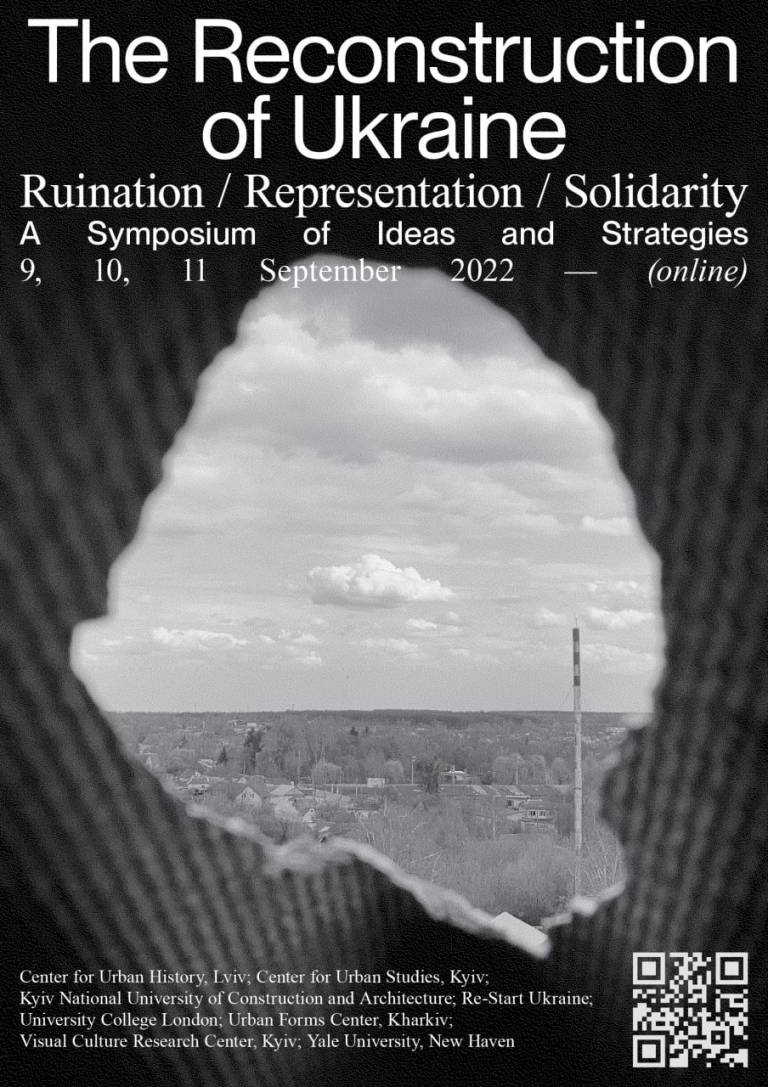The Reconstruction of Ukraine: Ruination / Representation / Solidarity
09 September 2022–11 September 2022, 12:00 pm–8:00 pm

A Symposium of Ideas and Strategies (online). Organised by: Center for Urban History, Lviv; Center for Urban Studies, Kyiv; Kyiv National University of Construction and Architecture; Re-Start Ukraine; University College London; Urban Forms Center, Kharkiv; Yale University, New Haven; Visual Culture Research Center, Kyiv
This event is free.
Event Information
Open to
- All
Availability
- Yes
Cost
- Free
Organiser
-
SSEES
The reconstruction of Ukraine – carried out not only after but also during a protracted, brutal war – must entail a process of the re-assertion of Ukrainian sovereignty over the country’s built environment as well as its economic, social and cultural fabric. The process of reconstruction should be led by Ukrainian actors and Ukrainian institutions; and it should be informed by a deep knowledge and experiential grounding in Ukrainian culture, society and heritage.
Although reconstruction must be a Ukrainian-led project, it ought also to be undergirded by non-invasive but far-reaching and sustainable international support in terms of funding, expertise and shared knowledge. In this respect, solidarity is a multi-directional process. Reconstruction can usefully be informed by sensitive, empathetic, ecumenical comparisons with other places and contexts which have undergone – or are still undergoing – processes of ruination and renewal.
“The Reconstruction of Ukraine: Ruination / Representation / Solidarity” devotes particular attention to cities, architecture, art, culture and psychological trauma – but the scope of the conversations it aims to start is broader. In due course, the discussions held during the symposium may coalesce into myriad projects, initiatives and experiments undertaken by government institutions, municipalities, educational and cultural bodies and other more interstitial actors. The ambition of this symposium is to establish a platform for dialogue, facilitating communication, collaboration and constructive argument between diverse actors and initiatives.
The photographs illustrating the conference website are taken by Vitya Glushchenko, documenting his work on grassroots reconstruction initiatives in Ukraine. Find out more about these initiatives and how to support them here.
Conference programme
- Ruination, Resistance, Shelter: Responses to the Direct Impact of War (9 September)
1. Ecocide & Urbicide
Darya Tsymbalyuk, Khaled Malas, Maskym Rokmaniko, Harris Piplas, Gerald Torres
This roundtable will generate a holistic discussion on the destruction unleashed by the war on Ukraine’s built and natural environment; also incorporating comparative perspectives from the Syrian and Bosnian wars.
2. Displacement & Shelter
Natalia Otrishchenko, Anastasiya Ponomaryova, Dima Srouji, Daryna Pyrogova, Sasha Topolnytska & Lindsay Harkema
Sites of displacement, refuge, sanctuary and exile constitute an integral part – and a precondition of – the reconstruction process. Refugee camps turn into cities; the boundaries between sites of refuge and sites of concentration, filtration and even extermination are not always stable or easily discernible; and the experiences of exile and sanctuary can also inform visions of rebuilding and reconstruction.
3. Heritage: Destruction, Salvage & Legacy
Iryna Matsevko, Iryna Sklokina, Kateryna Kublytska, Polina Baitsym, Yulia Frolova, Edward Denison
How has Ukraine’s cultural, tangible and intangible heritage been affected by war? What tools, technologies and strategies have been used to protect it? How can heritage be regulated and what is the relationship between practical concerns and ideological ones during a time of parallel “derussification” and “decolonization”?
4. Infrastructures & Superstructures
Sophie Lambroschini, Svitlana Matviyenko, Asia Bazdyrieva, Mykola Kostrytsia, Kate Brown
How is Ukraine’s “infrastructure” referring to energy, transport, communications and economic dimensions, among others – implicated in and impacted by war? What considerations must be borne in mind to rebuild and decolonize Ukraine’s infrastructure(s) in the war’s aftermath?
- Representation, Mourning, Memory: Working Through War (10 September 2022)
1. Trauma and the Space of Mourning
Oleh Bereziuk, Beatrice Patsalides Hofmann, Steven Marans, Maureen Katz
2. Art and War: Montage, Text, Image
Nikita Kadan, Mykola Rydni, Yevgenia Belorusets, Alevtina Khakhidze, Oleksiy Radynski, Laura Wexler, Marianne Hirsch
3. The Past in Progress: Employing & Decentring
Sofia Dyak, Mayhill Fowler, Kimberley St Julian Varnon, Michael Rothberg
4. Art Practice and War: Thinking Through an International Commons for Art and Education
Vasyl Cherepanyn, Olya Zhuk, Keller Easterling, Marta Kuzma, Peter Osborne
- Solidarity, Appropriation, Justice: Generating Common Futures (11 September 2022)
1. Masterplanning & Microplanning
Ievgeniia Gubkina, Oleksandr Anisimov, Christina Crawford, Iryna Miroshnykova, Yulia Frolova, Alan Plattus
What is the relationship between the social, human and aesthetic-material dimensions of reconstruction? How important will the role of architects, planners and institutions be, and how will they navigate their relationship with other actors and processes? At which scales will reconstruction take place, and what tensions and complementarities will transpire between top-down, bottom-up and intermediary processes?
2. Restitutions: appropriation, expropriation, regulation
Joanna Kusiak, Yulia Yurchenko, Oleksandr Kravchuk, Simon Johnson, Vladyslav Rashkovan, Denise Ferreira de Silva
What is the political economy of the reconstruction process? Will land nationalisation be necessary? How will Ukraine pay off its international debt, and what are the prospects for its cancellation? What mechanisms are in place to regulate the activities of profit-driven actors? How can reconstruction contribute to righting historical wrongs and to generating a common future for Ukraine?
3. Reconciliation & Retribution
Philippe Sands, Kateryna Busol, Hanna Yudkivska, Nathaniel Raymond, Francine Hirsh
What landscapes of transitional justice are transpiring in and for Ukraine? How will this impact the built, social and political fabric of the country? What changes will be made to the Ukrainian legal system to accommodate these demands, and how might this have far-reaching global effects on international law?
4. Building Initiatives for the Future
Natalia Gozak, Oleh Drozdov, Sergii Rodionov/Anna Kamyshan, Anna Kyrii, Ivan Verbytsky, Oleksandr Shevchenko, Yulia Krivich, Maria Gryshchenko
A conversation between representatives of multi-disciplinary initiatives on reconstruction located in Ukraine and overseas.
 Close
Close

